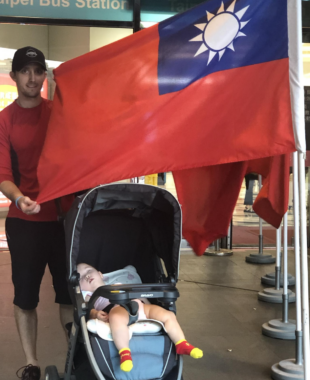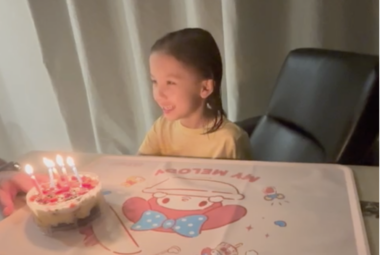Celebrating a personal milestone and an FDA approval
My daughter's 'Reborn Day' marks her second chance, thanks to gene therapy
Written by |

Six years ago, on Nov. 13, 2019, our daughter Rylae-Ann received a second chance at life. Every year since, we’ve celebrated it as her “Reborn Day,” when we reflect and remember how far she’s come. This year’s celebration, however, was an extraordinary moment of personal and national significance.
When Rylae-Ann was diagnosed with the rare genetic disease aromatic l-amino acid decarboxylase (AADC) deficiency, my wife, Judy, and I were plunged into uncertainty and taken down a dark path. There was little information available then, no road map to guide us, and — most devastating of all — no cure. Yet even in the face of overwhelming odds, we never gave up hope.
The start of our new journey

Rylae-Ann and her dad after their 2018 arrival in Taiwan for a clinical trial of a new gene therapy. (Courtesy of Richard E. Poulin III)
At 18 months old, Rylae-Ann participated in a clinical trial for gene therapy. There were no guarantees it would work, but we clung to the possibility and devoted ourselves to her care. Early intervention strategies became part of our daily routines, transforming ordinary tasks into opportunities for progress. Slowly but surely, we began to see the remarkable results of her treatment.
Today, Rylae-Ann is thriving in ways we once only dreamed possible. Our roles as parents have shifted from being 24-hour caregivers to cherishing the joys and challenges of everyday parenting. Her journey has inspired us to give back, not just for her, but for other families facing similar struggles.
This shared purpose led us to create Teach RARE, a nonprofit organization dedicated to empowering parents of children with rare diseases and special needs. We worked to provide educational strategies to parents and advocated for greater awareness of rare diseases such as AADC deficiency. Through speeches, partnerships with the medical community, and working with governmental regulatory bodies, we’ve championed the effectiveness of gene therapy for its global approval.
The European Union, United Kingdom, and several other countries have approved this groundbreaking treatment. Yet for years, the United States remained absent from this list. While I’ve spent most of my life abroad — from Japan and China to Thailand, which we now call home — knowing that families in my native U.S. still lacked access to this life-changing therapy was a heavy burden and an unmet goal.
Fate continues to pave the way
This year, as Judy and I prepared to celebrate Rylae-Ann’s fifth Reborn Day, we received incredible news: the U.S. Food and Drug Administration (FDA) had approved the PTC Therapeutics gene therapy, called Kebilidi (eladocagene exuparvovec-tneq) in the U.S. and Upstaza elsewhere. The timing felt like a miracle, evidence of a higher power at work. To have this announcement coincide with such a personal milestone was overwhelming and deeply meaningful.

Rylae-Ann prepares to blow out the candles on her cake to celebrate her “Reborn Day.” (Photo by Richard E. Poulin III)
Rylae-Ann’s progress continues to be the greatest gift we could ask for, and her journey motivates us to support others on a similar path. The FDA approval is not just a victory for science, but a beacon of hope for families around the world who now have access to a brighter future for their children.
Our deepest gratitude goes to PTC Therapeutics, the dedicated doctors, and the researchers who turned what once seemed like science fiction into a beautiful reality. With this breakthrough, even more children will have the opportunity to embark on their own journeys of learning, exploration, and discovery.
As we celebrate Rylae-Ann’s Reborn Day, we also celebrate the triumph of determination, love, and innovation. This story is not just hers; it’s a shared testament to what is possible when hope and science come together. We’ll now see even more children embark on a journey filled with learning, traveling, and exploration.
Note: AADC News is strictly a news and information website about the disease. It does not provide medical advice, diagnosis, or treatment. This content is not intended to be a substitute for professional medical advice, diagnosis, or treatment. Always seek the advice of your physician or other qualified health provider with any questions you may have regarding a medical condition. Never disregard professional medical advice or delay in seeking it because of something you have read on this website. The opinions expressed in this column are not those of AADC News or its parent company, Bionews, and are intended to spark discussion about issues pertaining to aromatic l-amino acid decarboxylase deficiency.






Leave a comment
Fill in the required fields to post. Your email address will not be published.